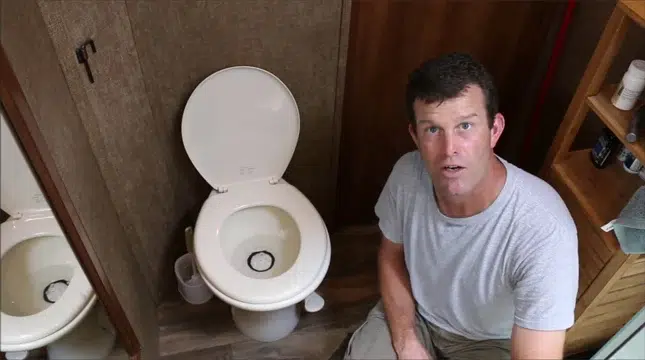Last Updated on April 20, 2023
For many RV owners, RV toilets can present challenges during the winter months to keep your RV toilet clean; otherwise, your black water tank could freeze and crack. If you miss out on using the chemicals for your RV toilet, you will have to replace the entire tank. Even if your tank doesn’t freeze and crack, it could become corroded and damaged from waste buildup.
Winterizing an RV toilet is an integral part of preparing for the cold weather months. Not only does it help to protect your plumbing system from freezing, but it’s also essential for maintaining proper sanitation and hygiene.
Using RV toilet chemicals during the winter months is crucial to ensure that your toilet works properly and that odors are kept at bay. In this ”how to use rv toilet chemicals for winter” guide, we will discuss what chemicals work best, why to use them, and how to use them when winterizing a toilet properly.
How to Use RV Toilet Chemicals for Winter: Steps
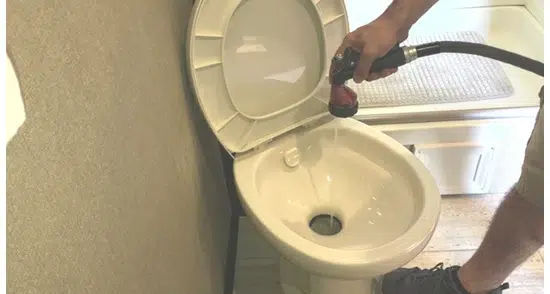
Winter can be a difficult time of year for RV owners. Not only is the weather colder, but chemical toilet treatments can become more complicated. The right combination of chemicals and procedures is necessary to ensure that your RV’s systems run effectively and efficiently all winter.
Step 01
Before you begin cleaning, remove all waste from the RV toilet bowl. Fill a bucket with warm water mixed with an RV toilet cleaning chemical product such as Aqua Kem or Aquafresh blue. Follow the instructions on the package for mixing ratios and other directions related to usage and safety.
Step 02
Prepare the RV toilet for cleaning. Ensure that the water line is disconnected from the toilet and the tank is completely emptied of liquid. Cover the floor around the toilet with plastic sheeting or a tarp to protect it from splashing.
Step 03
Select an appropriate RV toilet cleaner. Make sure to choose one specifically designed for RVs as opposed to regular household cleaners. The most common brand of RV toilet cleaner is Aqua Kem, which comes in both liquid and powder form.
Choose a product that contains enough chemicals to dissolve waste and tissue but not so much that it will affect rubber seals or cause corrosion in metal components.
Step 04
Apply the cleaner according to the directions on the package. Aqua Kem requires two ounces of liquid concentrate per 10 gallons of water or 2 cups of powdered detergent per 10 gallons of water. Add this mixture directly into your black tank and allow it to soak for 4 to 6 hours before flushing twice with additional clean water.
Step 05
When using either liquid or powder cleaner, fill the bowl with warm water first to ensure maximum contact between the surface and the product. To maximize cleaning power, add some additional cleanser directly into the bowl before pouring in more water if necessary.
Step 06
After letting your RV toilet sit in the solution for at least four hours, flush twice with clean water to remove any remaining residue from the bowl and tank walls. Once done, add additional fresh water if necessary until you reach a full level in your black tank indicator light (if equipped).
How to Choose the Right RV Toilet Chemicals for Winter?
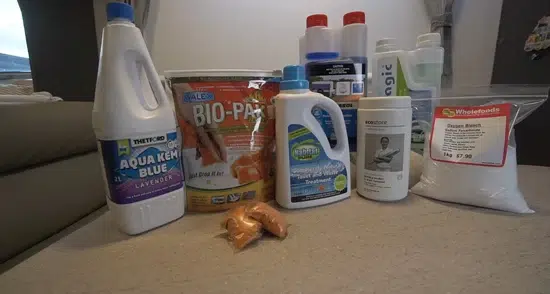
Steps to Purchase a Suitable RV Toilet Chemicals Product for Winter.
Step 01
Identify the type of RV toilet chemical needed (e.g., general purpose cleaner or specialty cleaner). Research the different RV toilet cleaning chemicals available in the market. Formaldehyde based products and chlorine based ones are available. Choose the right chemical for your RV toilets.
Step 02
Determine the amount/volume required to adequately clean the RV toilet during winter (based on the size of the tank or toilet). Once you have selected a product, read up on its usage instructions and safety precautions. It is best to purchase only certified RV toilet cleaning chemicals, as they come with detailed instructions and tips on using them safely and effectively.
Step 03
Research local stores or online retailers for available products and compare prices/quality/ingredients.
Step 04
Purchase a suitable RV toilet cleaning chemical (e.g., Thetford’s Aqua Kem Holding Tank Treatment & Deodorizer).
Step 05
Read customer reviews to get an idea of the effectiveness of a certain RV toilet cleaning chemical product.
Step 06
Make sure to check customer ratings, certifications, safety data sheets, and other important information related to the RV toilet chemical product.
Step 07
Check for any special instructions on the label, such as required dilution amounts, proper storage conditions, and shelf life of the product.
Step 08
Consider if you need an additional detergent or enzyme based product for deeper cleaning and odor prevention.
Step 09
Calculate the amount of RV toilet cleaning chemicals needed for winter use, taking into account size and usage frequency according to the manufacturer’s instructions or recommendations.
Step 10
Choose a reputable supplier or store to make your purchase; compare prices and ingredients between brands when possible (and look out for discounts.)
Step 11
Follow all safety precautions listed on the label, such as wearing gloves/eye protection when handling the product, using it in well ventilated areas, keeping it out of reach from children and pets at all times, etc.
Step 12
Purchase suitable containers for storing unused RV toilet chemicals safely; ensure that containers are tightly sealed so that no spills occur during transport or storage in your vehicle, RV home, etc.
Step 13
Properly dispose of any leftover products after use or expiration date according to local regulations; never pour down drains or soil/garden since these chemicals can harm plants, animals, and aquatic organisms in lakes or rivers, etc.
Why Is It Important To Buy Good Quality and Effective RV Toilet Chemicals?
It is crucial to purchase quality and effective RV toilet chemicals for breaking down waste to maintain the cleanliness of your RV in winter as well as its longevity. Poorly made or ineffective chemicals can lead to build-up that could clog or damage components, leading to expensive repairs.
Look for chemicals specifically designed for use in RV toilets, check that they are safe for septic systems and the environment, consider the type of chemical (biological vs. chemical), and read customer reviews and ratings to assess effectiveness.
You’ll also get a better product if you buy from a reputable retailer, manufacturer, or supplier. Through our RV product analysis, we’ve already reviewed the most affordable RV toilet chemicals for breaking down waste. You can see what it looks like.
Types of RV Toilet Chemicals Available
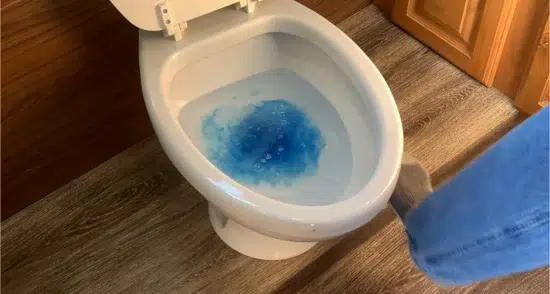
1. Chemical Disinfectants
When looking for the ideal chemicals to dispense in an RV toilet during the winter months, chemical disinfectants are a great option. These chemical formulas are designed to kill bacteria, germs, and other forms of microorganisms that can be present on surfaces and in the air.
Many chemical disinfectants come in either liquid or powder form, and they are easy to use by simply mixing them with water and following the instructions on the label. It’s vital to ensure that your product is EPA approved, so you know it is safe to use around people and pets.
Chemical disinfectants also have longer lasting effects than other products because they not only kill bacteria and germs but continue to prevent them from growing back for several weeks after application.
2. Septic Tank Cleaners
For RV toilets, septic tank cleaners are especially beneficial during cold weather because they help keep septic tanks functioning properly even when temperatures drop below freezing.
Septic tank cleaners break down solid waste within the tank more effectively and reduce odors, as well as create an environment where good bacteria can thrive.
To use a septic tank cleaner, simply pour it into the toilet bowl before flushing it with warm water every few weeks throughout the wintertime. The product will then start breaking down solids in your tank, helping it remain healthy despite colder temperatures outside.
3. Enzymes and Biological Treatments
Enzymes and biological treatments are another effective way of keeping RV toilets clean during cold weather. These treatments work by introducing enzymes and beneficial bacteria that help break down organic materials like fats, starches, and proteins found in human waste and paper products used while cleaning up after using the toilet.
Biological treatments don’t just clean up viable bacteria. They also aid in eliminating odors associated with these wastes since they consume toxic gases created by decomposition processes inside your RV’s septic tank system.
Once added to your toilet bowl or tank, enzymes start working immediately upon contact with fluids present; no mixing is required.
4. Formaldehyde Based Toilet Bowl Cleaners
Formaldehyde based toilet bowl cleaners provide fast acting solutions for keeping your RV toilet sanitized during cold weather and helping reduce foul odors from organics trapped inside your tanks over time.
Formaldehyde based cleaners contain very strong detergents that can quickly eliminate tough stains from porcelain surfaces, such as those found inside RV toilets, due to their acidity level.
It should be noted that these harsh ingredients may damage some surfaces if used too often or left on for extended periods of time without being rinsed off afterward, so caution should be exercised when using them indoors or outdoors during colder weather months when temperatures drop below freezing point.
Advantages and Disadvantages of Each Type of Chemical
With cold temperatures coming, choosing the right chemicals to use in your RV toilet and wastewater system while winter camping is important. Here are some benefits and drawbacks of each type of chemical treatment when deciding.
Chemical Disinfectants
Chemical disinfectants are fast acting and effective in killing germs. They can be caustic and may corrode fixtures or pipes over time. If used correctly, these chemicals can effectively prevent biofilm buildup from developing in the waste water tank. Because these disinfectants work quickly, their effects will last longer than other treatments.
Septic Tank Cleaners
Septic tank cleaners are great for quickly breaking down solid waste. They may produce strong odors and require more frequent treatments than other options.
Despite this potential downside, septic tank cleaners still provide an effective means for keeping wastes from accumulating in the wastewater tank during winter camping trips. This can help prevent backups and other problems caused by a full tank during colder months.
Enzymes and Biological Treatments
Enzymes and biological treatments are non toxic, highly effective ways to break down solid waste without producing strong odors or causing corrosion to pipes or fixtures. These treatments generally take longer to take effect than chemical disinfectants.
So they may only provide immediate relief if your wastewater tank is backed up or complete. Nevertheless, enzymes and biological treatments remain effective to keep waste broken down during winter camping trips.
Formaldehyde Based Toilet Bowl Cleaners
Formaldehyde based toilet bowl cleaners are another popular option for quickly eliminating germs without producing noxious odors or corroding fixtures or pipes like some chemical disinfectants can do over time.
But formaldehyde based products are also highly acidic and could eat away at plastics over time if not adequately monitored or maintained at appropriate levels according to manufacturer’s guidelines.
Why Do You Need to Use RV Toilet Chemicals for Winter?
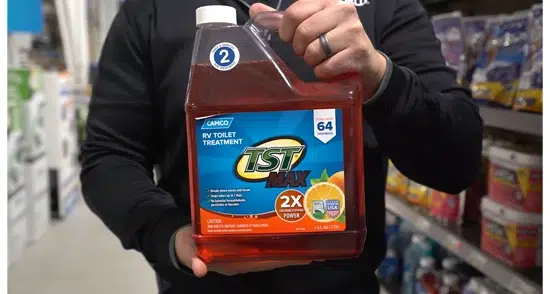
Using RV toilet chemicals is essential when it comes to winterizing your RV. Not only do they help keep your plumbing system functioning correctly, but they also protect you and your family’s health. There are several reasons why RV toilet chemicals should be used during the winter months.
- The first is that RV toilet chemicals reduce the likelihood of pipes being damaged due to freezing temperatures during winter. When temperatures drop below 32 degrees Fahrenheit, water can freeze in your pipes resulting in costly repairs or a complete replacement.
Using RV toilet chemicals can significantly reduce these risks as the chemical helps insulate the pipes from harsh weather elements.
This protection is especially important if you plan to take trips during cold weather, as it prevents surprises from occurring while you’re away from home.
- Another reason RV toilet chemicals are recommended for winterization is that they help reduce odors associated with RVs and campers. During warm months, food and other waste materials can quickly break down and start to smell inside an RV or camper, making living conditions uncomfortable.
With specially formulated RV toilet chemicals, these odors can be controlled, leading to a more pleasant experience within your recreational vehicle.
- Finally, using RV toilet chemicals during winter months helps prevent the spread of germs and bacteria throughout your vehicle’s plumbing system.
When left untreated, bacteria can quickly accumulate in pipes leading to potential health concerns for anyone inhabiting the space. Treating the water with special chemical compounds eliminates this risk, leading to cleaner drinking water for everyone onboard.
Overall, numerous benefits are associated with using RV toilet chemicals for winterization, such as reduced pipe damage due to freezing temperatures, odor control, and better sanitation. Be sure to invest in high quality products specifically designed for recreational vehicles so that you can get the most out of your experience the next time you travel.
How To Maintain Optimal Performance During Winter Months?

A . Monitor Water Levels in RV Toilet Tank Regularly and Refill as Needed
It is important to monitor the water level regularly and refill it as needed to maintain the optimal performance of your RV toilet tank through the winter months. This is especially true in colder climates since water can freeze more quickly in cold temperatures, which can cause damage to plumbing fixtures and the septic system.
Checking the water level every few days or weekly is recommended to ensure that it stays high and freezes. If you find that it has reached a dangerously low level, use insulated hoses or buckets with heated water to refill the tank gently without causing any shock to the plumbing system.
Additionally, insulate the tank and pipes, if possible, for extra protection against freezing conditions.
B . Flush the RV Toilet Tank Frequently to Remove Waste Accumulation
As winter approaches, you should also flush out your RV toilet tank quite often to ensure that there is no waste accumulation from the bottom of the tank before it can freeze and cause clogs or blockages in the drain lines.
You may also install an additional flush valve on your RV toilet tank to make flushing easier and more effective during colder temperatures.
C . Use Appropriate Amounts of Additives After Each Use
Additives are vital in maintaining the optimal performance of an RV toilet tank during winter months, as they help keep waste down in liquefied form so it can be flushed away without clogging lines or backing up into other areas of your RV.
Different types of RV toilet additives are specifically designed for use in cold weather; however, ensure you don’t overuse additives as they may reduce oxygen levels in the tanks, which can lead to harmful bacteria growth if not appropriately monitored.
Always refer to manufacturer instructions for best results regarding additive usage during winter months.
D . Test and Adjust Dilution Rates if Necessary
Finally, testing and adjusting dilution rates for your RV toilet tanks during winter months may be necessary depending on temperature fluctuations within your area throughout different times of the year.
This will help ensure adequate amounts of water are used when flushing so that waste doesn’t accumulate unnecessarily within your septic system or drain lines leading from your RV’s plumbing fixtures.
To do this correctly, you’ll need access to a flow meter that measures fluid velocity through pipes connected directly to the holding tanks on your unit. Once this meter is set up correctly, you can easily adjust dilution rates based on readings taken over time. Just make sure to stay within manufacturer prescribed limits when doing this.
Final Thoughts
RV toilet chemicals are a great way to keep your RV functioning properly during winter. Using these chemicals can prevent blockages and other problems from occurring.
When using RV toilet chemicals, always follow the directions on the package carefully. In most cases, you will need to add the chemicals to the tank and then flush the toilet several times to ensure that the chemical substances are evenly distributed.
By following the simple steps in the article, you’ll be sure that your RV toilet will be in good working condition when you are ready to hit the road again.

